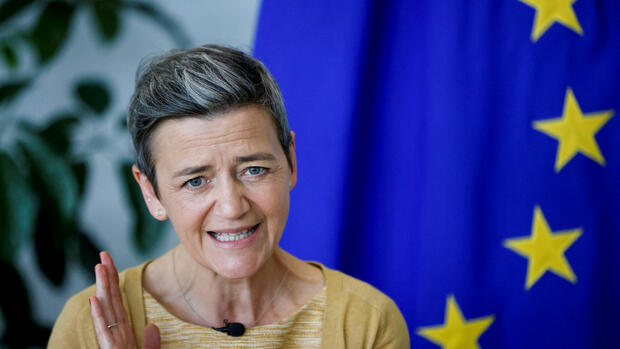The EU Commissioner is taking the next step in the proceedings against Google.
(Photo: Reuters)
Brussels The EU Commission is taking the next step in important competition proceedings against Google’s advertising business. The Commission threatened on Wednesday that the Internet group would have to sell parts of its advertising services and thus parts of its money machine. The central question here is whether Google has given itself an advantage over its rivals in advertising services and has thereby distorted competition.
“The company collects user data, sells advertising space and acts as an intermediary for online advertising,” said EU Commissioner Margrethe Vestager, who is responsible for fair competition. Google is therefore represented at almost all levels of the adtech industry. “We fear that Google may have used its market position to favor its own brokerage services,” said the politician. This is the result of an investigation by the Commission that has been running since mid-2021.
She sees no other way to make the digital advertising market with Google as a key player compliant with competition law than through a partial sale, said Vestager. “Google is everywhere.” This step is always the last resort in such a process.
Google said: “We disagree with the Commission’s view and will respond accordingly.” The Commission’s investigations focused on a narrowly defined aspect of the advertising business and were not new. “Google remains committed to creating value for its publisher and advertising partners in this highly competitive industry.”
There are high fines in the room. Google can comment on the allegations. But if the Commission concludes that there is sufficient evidence of a breach of EU law, it can impose a fine of up to 10% of annual global turnover. On the other hand, Google could defend itself legally.
Google’s main source of income
Google’s main source of revenue is online advertising, as the Commission points out. The company not only makes money by advertising on its own websites such as Google Search. The company also mediates between advertisers who want to place their advertising online and publishers, bloggers or other content creators who want to place advertising on their website, for example.
Google has a special position in the online advertising market: the group not only sells ads, but also operates the platform with which they are delivered online. According to experts, Google therefore has an information advantage when it comes to the question of how consumers use the Internet. This knowledge can also be used to display ads more specifically than others.
“The Commission has come to the preliminary conclusion that Google has abused its dominant position since at least 2014,” the EU said. Specifically, it is about, for example, that Google is said to have favored its own advertising exchange AdX by informing AdX in advance about the best bid from competitors. In addition, the in-house advertising service Google Ads, which other companies can use to place ads on pages belonging to Google, is said to have avoided competing advertising exchanges, which made AdX the most attractive advertising exchange.
In principle, as the EU Commission always emphasizes, the investigations are conducted with an open outcome. In another case against Google at the end of last year, the competition authorities came to the conclusion that there was no distortion of competition.
More: These online services will be monitored by the EU in the future
